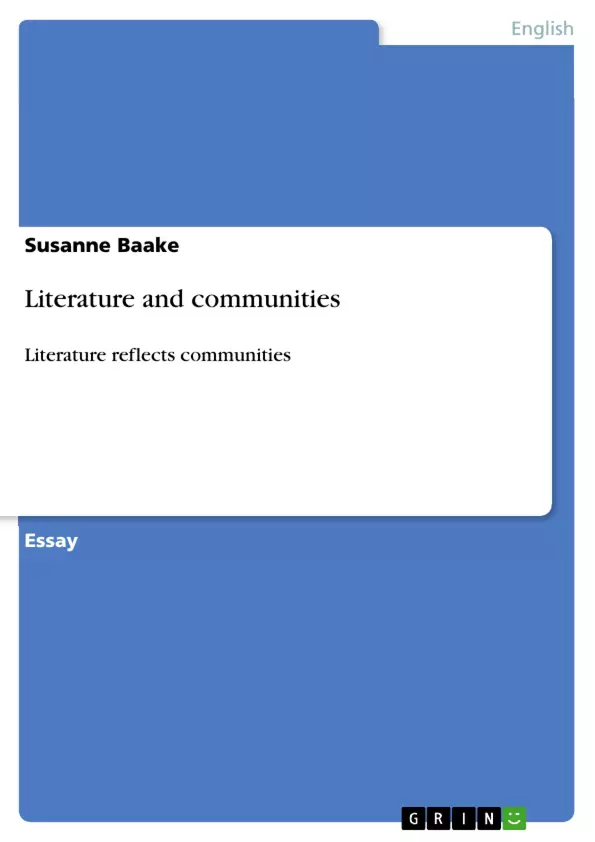Literature reflects communities by writing about the given time, culture, beliefs and attitude people had during a given time. Authors use literature to make aware of situations in society that should be changed to the better by using examples paired with descriptions of the daily life situation of people and vicinity, many times combined with explaining the economic situation.
Inhaltsverzeichnis (Table of Contents)
- Importance of Language in Literature
- Literature can demonstrate importance of education in communities
- Literature reflects on society brings changes and progress
Zielsetzung und Themenschwerpunkte (Objectives and Key Themes)
This paper examines how literature reflects communities and the influence of individuals on society. It explores the ways in which authors use language and narrative to convey social issues, cultural attitudes, and the importance of education. The paper analyzes two short stories, "The Lesson" by Toni Cape Bambara and "A Rose for Emily" by William Faulkner, to illustrate how literature can create awareness and promote change.
- The relationship between literature and society
- The role of language in conveying cultural perspectives and social issues
- The importance of education and its impact on individuals and communities
- The power of literature to bring about change and progress
- The influence of social expectations and traditions on individual lives
Zusammenfassung der Kapitel (Chapter Summaries)
The paper begins by discussing the importance of language in literature, using "The Lesson" by Toni Cape Bambara as an example. The author uses the dialect spoken by African-American people in the south to illustrate their culture and struggles. The story highlights the feelings of underprivilege experienced by children growing up in poverty and the need for education.
The paper then explores the importance of education in communities, focusing on "The Lesson." The author uses Miss Moore's character to showcase the importance of education and the potential it holds for all individuals. She shows how access to education can lead to greater equality and opportunity.
The paper concludes by analyzing "A Rose for Emily" and how literature can reflect on society and bring about change. The author uses the story to explore the impact of societal norms and expectations on individual lives. He critiques the prejudices and hypocrisy of the southern society, highlighting how individuals can be trapped by social pressures.
Schlüsselwörter (Keywords)
The main keywords and focus topics of this paper include literature, society, culture, language, education, social change, individual agency, prejudice, tradition, and the impact of the past on the present.
Frequently Asked Questions
How does literature reflect the values of a community?
Literature reflects communities by documenting the culture, beliefs, economic situations, and social attitudes of people during a specific period in time.
What is the significance of language in Toni Cade Bambara's "The Lesson"?
Bambara uses the specific dialect of African-Americans in the south to authentically represent their culture and the struggles of children growing up in underprivileged environments.
How is education portrayed as a tool for social change?
Through characters like Miss Moore in "The Lesson," literature demonstrates how access to education can empower individuals to recognize inequality and strive for progress within their communities.
What does William Faulkner's "A Rose for Emily" say about society?
Faulkner's story explores how rigid societal expectations, traditions, and prejudices in the American South can trap individuals and lead to tragic outcomes.
Can literature actually influence society to change?
Yes, authors often use literature to create awareness of social injustices, prompting readers to question the status quo and envision a better future.
- Quote paper
- Susanne Baake (Author), 2008, Literature and communities, Munich, GRIN Verlag, https://www.grin.com/document/136811



